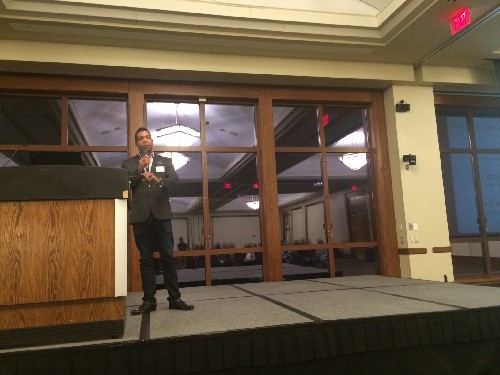Futurestay CEO Phillip Kennard Talks Entrepreneurial Journey at Montclair Entrepreneurs

[At the Montclair Entrepreneurs meetup on March 4, speakers from three New Jersey technology startups gave students and members of the community accounts of their entrepreneurial journeys. For each one, this journey was unique. Here we present an article on Philip Kennard, of tech startup Futurestay. Future articles will cover Hani Shabsigh, of Inbox Messenger, and Jason Vitug, of Phroogal.
The Montclair Entrepreneurs meetups take place on the campus of Montclair State University and are an offshoot of Montclair State’s Feliciano Center for Entrepreneurship. The meetup has 1,500 members and is organized by Feliciano Center director Dennis Bone, and two other associates of the Center, Jason Frasca (instructor and mentor) and Sharon Waters (program manager).]
At the March 4 Montclair Entrepreneurs meetup, Philip Kennard, CEO and CTO of Futurestay, a company that offers a vacation property management system, spoke about his entrepreneurial journey. Kennard’s company was conceived in New Jersey and has its offices at JuiceTank, in Somerset.
Kennard told the group about four important business principles that startup founders have to get right before they can get funding and scale: finding a purpose, building a team, finding a business model and finding a true champion.
For Kennard, finding the right purpose was the easy part. “I had been a software developer for a long time, and one of my clients came to me with a problem.” He said that there was no formal vacation-property rental solution. “My entrepreneurial sense started tingling,” and it told him that there would be a huge opportunity for the entrepreneur who solved this problem.
After doing more research, Kennard realized that this could be a great business , but he would need a team to help execute it, especially since he disliked selling. “I dreaded getting on the phone with customers day in and day out, explaining the system and trying to get them to give me their credit card information.”
He noted that he was “pretty lucky” in finding his cofounder. “One of my good friends, who was also a software consultant and had a marketing background, John Fabio, became my cofounder. He came at this from a totally different perspective. Selling was his favorite thing.”
“So when you are building your team … the first thing you need to do is find a set of people with complementary skills that will come together for a singular purpose,” Kennard advised.
Developing the business model proved to be more difficult, he noted. After the team had worked on Futurestay for a while, and already had some customers, the founders realized that the original approach — building a website for every customer, with the Futurestay engine in it — wasn’t going to be scalable.
There were many sites offering free websites out there, so customers didn’t much value what Futurestay could bring to the table. The founders knew that they could offer their customer base something different and of tremendous value, but that didn’t matter because their customers, what they called “prosumers,” wouldn’t pay.
Futurestay had the right model but not the right method of delivery, Kennard said, so the founders pivoted their business model. They discovered that offering access to the Futurestay engine for free, and then charging when a vacation-rental owner had bookings or used other features of the system, would better align their business with the customers’ needs.
Instead of remaining formidable competitors, free website companies like Wix and WordPress became potential partners. “Months later, Wix became our partner, and that started our global growth and traction,” he noted.
Kennard believes that every startup needs a champion, and should spend some time searching for the right one. Champions are powerful defending warriors. They can help you refine your business model and pitches, give you industry validation, help you understand the space you’re in and how you can approach it, and tell you how other companies are going to react when you enter their markets or approach them to partner. They also give you validation when you are talking to investors, he said.
“We thought that just because Futurestay had traction and a great team and product, we would be able to get funding,” Kennard said. However, Futurestay couldn’t get by the gatekeepers, the associates at VC and angel funds who are looking for names they recognize and clear indications that a company is worth bringing to the attention to the people who actually make the decisions.
Kennard said he stopped looking for investors and started “focusing on our community and building relationships. …We started looking for people who could help us grow the company by giving us strategies, as opposed to writing checks. …We found that when someone starts to value your company, they like the company and they like you, they are more than happy to give you introductions to people,” and to get you past the gatekeepers.
“Having a champion is tremendously important,” he said. “After you pitch [to an investor], you are going to have to leave the room. But if you have a champion in there that really believes in your business and believes in you, they will keep defending your business and help you get that funding round.”
Once Futurestay started focusing on building relationships, and not just on getting the checks, the checks started coming in, Kennard added.

